Education
This timeline lists significant moments in education in Canadian history.
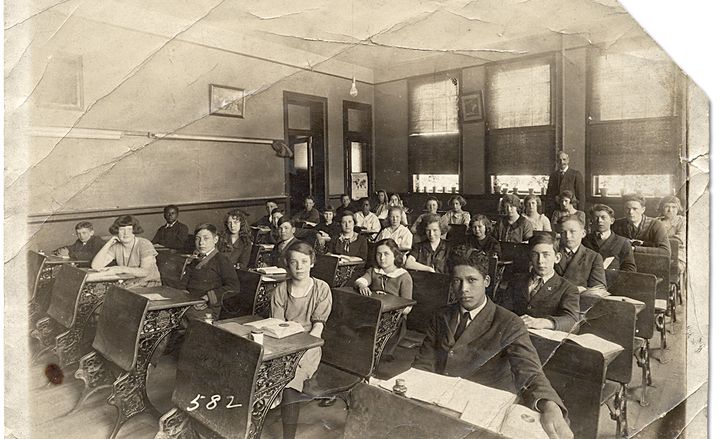
-
March 26, 1789
Education
Pictou Academy Founded
A Nova Scotia statute established the Pictou Academy.
-
December 19, 1813
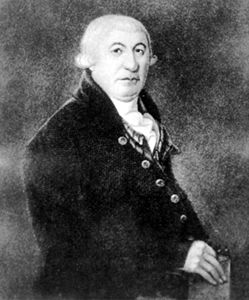
Education
Death of James McGill
Fur trader James McGill died, leaving an endowment of £10 000 for a college in Montréal (later McGill University).
-
May 22, 1820

Education
Dalhousie University Cornerstone
The cornerstone of Dalhousie University was laid in Halifax.
-
March 31, 1821
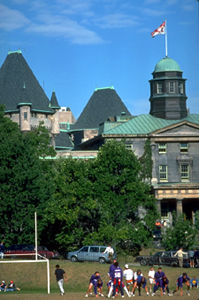
Education
McGill Receives Charter
University of McGill College (forerunner of McGill University) received its charter.
-
February 10, 1829

Education
King's College Founded
King's College at Fredericton (later the University of New Brunswick) received a royal charter. UNB was incorporated in 1859.
-
January 04, 1830

Education
Upper Canada College Opened
Upper Canada College opened at York (later Toronto).
-
January 21, 1839
Education
Acadia College Opens
Acadia College opened at Wolfville, NS.
-
September 18, 1841
Education
Public Schools Established
An Act for the establishment and maintenance of public schools in Canada was passed.
-
October 16, 1842
Education
Queen's University Founded
Queen's University was founded as Queen's College.
-
January 19, 1843
Education
Mount Allison Founded
Mount Allison Wesleyan Academy was opened in Sackville, NB.
-
December 09, 1843
Education
Bishop's University Founded
Bishop's University at Lennoxville, Québec, was founded.
-
December 31, 1849
Education
King's College Becomes U of T
King's College in Toronto was secularized, becoming on January 1, 1850, the nondenominational University of Toronto.
-
January 15, 1852
Education
Trinity College Opened
Toronto's Trinity College opened.
-
December 08, 1852
Education
Laval University Charter
Laval University at Québec received a royal charter.
-
August 15, 1866
Education
University of Ottawa Formed
The College of Ottawa became the University of Ottawa.
-
July 01, 1867
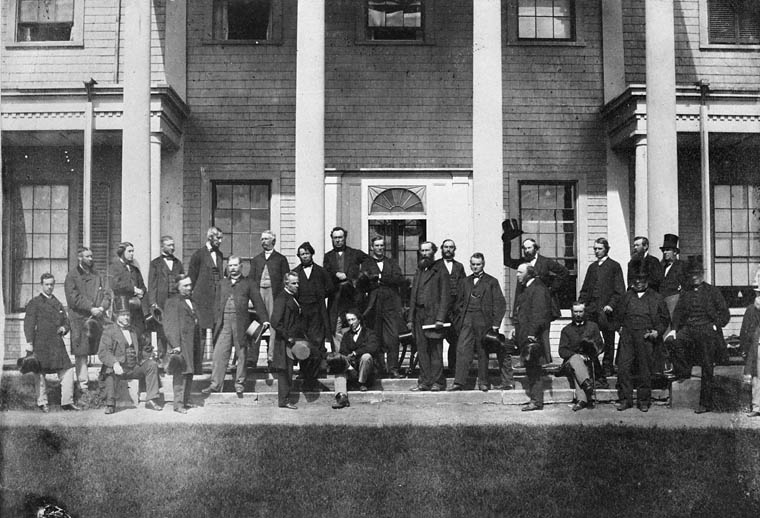
Education
BNA Act Protects Some Minority Religious Education Rights
The British North America Act of 1867 gave provinces authority over education with one significant exception: Section 93 of the Act protected the religious education rights of the Protestant minority in Quebec and the Roman Catholic minority in Ontario. In Quebec, a dual confessional school system, controlled by Protestants and Roman Catholics, became entrenched in law. Although Jews and members of other faiths could attend either Protestant or Catholic schools, they did not possess equal education rights.
-
April 16, 1874

Education
Agricultural College Opens
The agricultural college at Guelph, Ont, received its first students.
-
February 28, 1877
Education
University of Manitoba Founded
The University of Manitoba was organized by provincial statute and opened June 20.
-
March 07, 1878
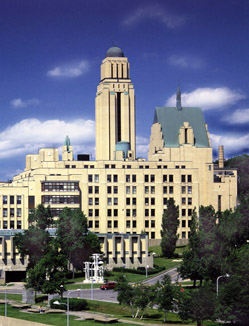
Education
Universities Incorporated
The University of Montreal and the University of Western Ontario were incorporated.
-
April 23, 1887

Education
McMaster Founded
McMaster University was founded in Toronto by the union of Woodstock College and the Toronto Baptist College.
-
March 31, 1890
Education
Manitoba School Act
The Manitoba School Act abolished publicly funded support for separate schools for Catholics. The aggrieved French minority argued that the Act violated the agreements under which Manitoba entered Confederation.
-
January 01, 1903

Education
Pinsler Case and Education Act, 1903
After a Protestant school board refused to honour a scholarship won by Jacob Pinsler, the son of Jewish immigrants, the Pinslers sued. However, the Quebec Superior Court upheld the board’s position because only Protestants and Roman Catholics had constitutional education guarantees. Fallout from the Pinsler case led to the adoption of the Education Act in 1903. It stipulated that Jews would be considered Protestants for educational purposes, and the Protestant board would receive funding based on enrolment. Nevertheless, problems persisted and dissatisfaction on all sides increased. (See also Jewish School Question.)
-
March 07, 1908

Education
UBC Founded
The University of British Columbia was founded. It began operations in 1915.
-
September 23, 1908
Education
University of Alberta Opens
The University of Alberta at Edmonton opened, with 37 students.
-
October 08, 1908
Education
Collège Marguerite-Bourgeoys Opened
After many years of deliberations, Sœur Sainte-Anne-de-Marie opened the first high school for girls in Montréal, on Sherbrooke Street. It would become the Collège Marguerite-Bourgeoys.
-
September 20, 1910
Education
École des Hautes Opens
The École des Hautes études commerciales opened in Montréal.
-
August 17, 1912
Education
Circular No. 17
The Ontario Department of Instruction issued Circular No. 17, which banned the use of French in Ontario schools past Grade 1.
-
May 08, 1919
Education
L'Université de Laval de Montréal Established
With the signature of the Quum Illmi by Pope Benoît XV, l'Université de Laval de Montréal became independent from l'Université de Laval de Québec. It would become l'Université de Montréal.
-
February 14, 1920
Education
L'Université de Montréal
The Université de Montréal was incorporated.
-
November 30, 1924

Education
Taschereau’s Special Commission on Education
In 1924, Quebec Premier Louis-Alexandre Taschereau established a Special Commission on Education to examine the case of Jewish students in Quebec’s public school system. After the commissioners remained at an impasse, Taschereau referred the 1903 Act to the Quebec Court of Appeal. It concluded that the Act violated section 93 of the BNA Act and was therefore invalid. Jews had no legal rights to attend Protestant schools, teach or serve as commissioners. The court also ruled that the Quebec government did not have the authority to set up separate schools. The government appealed the decision to the Supreme Court of Canada. In 1926, it upheld the appeal court rulings but concluded that the provincial government had the right to establish separate schools. In 1928, the case was referred to the Judicial Committee of the Privy Council in Britain, which agreed with the Supreme Court. (See also Jewish School Question.)
-
April 01, 1930

Education
The David Bill is Enacted in Quebec
In April 1930, the Liberal government of Premier Louis-Alexandre Taschereau passed a law to create a Jewish school board in Quebec. Under the statute, government-appointed Jewish commissioners were legally required to continue negotiations with the Protestant and Catholic school boards. However, the commissioners obtained few concessions other than an end to segregation. Discriminatory practices in hiring and religious education continued, as did taxation without representation. Opposition to the David Bill — named after Provincial Secretary Athanase David — erupted. Support within the Jewish community was split. The Roman Catholic Church denounced the Bill and French-Canadian nationalists protested. The Bill was repealed in 1931. (See also Jewish School Question.)
-
March 26, 1959
Education
York University Founded
Ontario's 10th university, York University in Toronto, was formed.
-
September 19, 1960
Education
University of Calgary Founded
The University of Alberta opened a new 130 ha campus on the outskirts of Calgary - later to become the University of Calgary.
-
June 06, 1961
Education
CUSO Formed
CUSO was founded to place skilled Canadians in postings to provide technical assistance in the Third World.
-
March 01, 1963

Education
Simon Fraser U Established
The BC government established Victoria College as the University of Victoria, and founded Simon Fraser University in Burnaby (opened 9 September 1965).
-
May 27, 1963
Education
NAIT Opens
The Northern Alberta Institute of Technology opened in Edmonton.
-
January 01, 1965

Education
Last Racially Segregated School in Ontario Closes
Thanks to the activism of Black parents, racially segregated schools in Ontario were gradually phased out. The last racially segregated school in Ontario, School Section No. 11 in Colchester, closed in 1965. This was accomplished after newly elected MPP Leonard Braithwaite pushed for the clause on segregated schools for Blacks to be officially removed from provincial education policy. Ontario and Nova Scotia were the only provinces to legislate racially segregated schools. The last one in Nova Scotia, in Guysborough County, closed in 1983. However, informal segregation was present in other provinces including Alberta, Saskatchewan, New Brunswick and Prince Edward Island.
-
September 09, 1965
Education
Simon Fraser U Opened
Simon Fraser University opened in Burnaby.
-
January 29, 1969
Education
Sir Williams Computer Riot
A committee dismissed the complaint by six Black Caribbean students at Sir George Williams University (now part of Concordia University, Montréal) who accused a biology lecturer of racism. The students and 200 of their supporters subsequently occupied the Computer Hall and initiated one of the largest student uprisings in Canadian history.
-
February 15, 1973

Education
Pearson College Established
Lester B. Pearson College of the Pacific was established north of Victoria.
-
August 24, 1974
Education
Concordia University Created
Concordia University was created in Montreal by the merger of Loyola College and Sir George Williams University.
-
September 25, 1974
Education
Pearson College Opens
The first 100 students arrived to begin classes at the Lester B. Pearson College of the Pacific, outside Victoria.
-
January 01, 1993

Education
Ontario Launches Anti-Racism Education Guidelines
In 1993, the Ontario Ministry of Education and Training launched the Anti-Racism and Ethnocultural Equity in School Boards guidelines — a resource for school boards to implement policies to identify and eliminate various forms of racism. Since then, the anti-racism education movement has grown and progressed throughout Canada.
-
November 02, 1996
Education
Death of Margaret Ormsby
Historian Margaret Ormsby, whose book British Columbia: A History (1958) was the standard history text of BC for 3 decades, died at Kalamalka Lake, BC.
-
January 01, 1997

Education
BNA Amendment Allows Neutral Linguistic School Boards
The Jewish School Question was finally resolved in 1997 when section 93 of the BNA Act was amended. This enabled the creation of religiously neutral linguistic school boards to replace confessional schools in Quebec. The transition to a secular public school system granted legal education rights to the Jewish community in Quebec after more than 100 years of inequality.
-
June 30, 1997

Education
Poll on Knowledge of Canada
An Angus Reid poll found that the average Canadian student knew the answer to only 10 of 30 questions about Canada. only 30% could identify John A. Macdonald as Canada's first prime minister.
-
October 27, 1997
Education
Teachers Strike in Ontario
Five unions representing 126 000 teachers went on strike in Ontario, the largest teacher strike ever in north America. The teachers protested reforms put forward by the Mike Harris government. The strike ended Nov 7.
-
March 16, 2005
Education
Student Protest in Québec
One of the biggest protests ever, involving 80,000 students, took place in downtown Montréal. At issue was a $103 million cut to bursary funds by the government. As many as 200,000 college and university students from nearly every region went on strike for six weeks.
-
August 26, 2021

Education
Ryerson University Announces It Will Be Renamed
The board of governors of Ryerson University agreed to accept all 22 recommendations made by the Standing Strong (Mash Koh Wee Kah Pooh Win) Task Force, which was established in December 2020 to “develop principles to guide commemoration at the university and to respond to the history and legacy of Egerton Ryerson within the context of the university’s values.” The recommendations included renaming the school and making materials available on the history and legacy of Egerton Ryerson, one of the architects of Canada’s residential school system.
